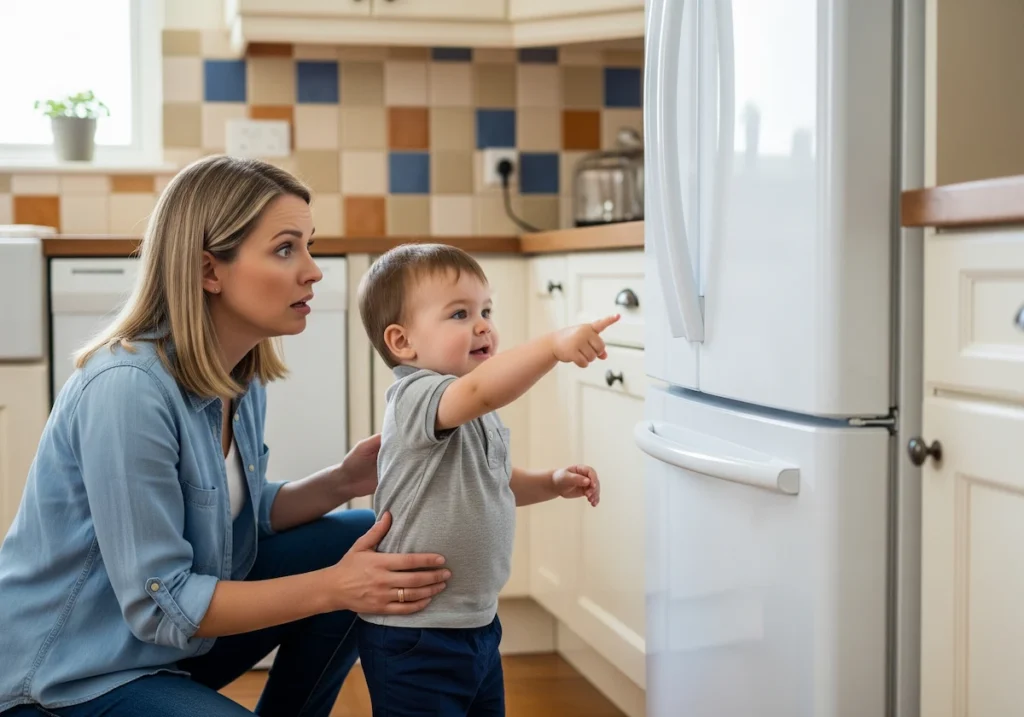If you’re worried that your child has a speech delay, this article will show you a few key signs to look out for, cover some potential underlying causes, and explain what you can do in order to promote healthy speech development.
We will even point you toward where and how to get professional help.
Don’t worry, most children with speech issues eventually overcome their speech delays and go on to live happy, “normal” lives, talking just like the rest of us do.
In this article, we’ll cover:
- Warning signs of speech delays at different ages
- When to seek professional help
- Practical steps you can take at home today
- How to support your child’s speech development
Ready to learn what to watch for and how to help your child communicate better?
Understanding Typical Speech and Language Development
Speech development in each child varies, but in general, most children say their first words and understand simple requests between 12-18 months. If your child has a speech delay, they may not say their first words until 20-24 months or beyond.
There is plenty of data to support this as well. Research shows that children understand about 60 words within 18 months. And by age 2, kids usually have over 50 words in their vocabulary.
But you should know that every child develops at a different pace. Some children grow earlier, while others take their time. When you understand the difference between speech and language, you can identify where your child might need support.
Differentiating Between Speech and Language
Many parents use “speech” and “language” as if they mean the same thing. They’re actually quite different, and your child might struggle with one, both, or neither.
Here’s how to tell them apart:
- Speech (The Sounds): Does your child struggle to say words the right way? Speech involves the physical mechanics of forming sounds with your mouth, tongue, and lips. So when there’s a disorder, your child struggles to make clear sounds, so “cat” might come out as “tat” or “banana” sounds like “nana.”
- Language (The Meaning): Language includes both understanding words and using them to share ideas. This covers what “hungry” means, understanding when someone says “put on your shoes,” or figuring out how to ask for help. Your child might understand everything but struggle to express themselves, or they might speak clearly but have trouble following instructions.
Your child could have a speech delay, a language delay, or both. Now that you understand these differences, let’s look at the specific warning signs that might indicate your child needs extra support.
Recognising the Major Signs of a Speech or Language Delay
If your baby isn’t reacting to loud sounds or voices, that’s an early sign of speech delay. Not hearing those sweet babbles or pleasure sounds by 7 to 8 months can be a red flag too. Also, no gestures like waving or pointing by 12 months might mean your baby has communication issues.
When you know these signs, you’ll understand your child’s developmental stage. These clues are the best indicators to figure out if your child needs extra support.
Let’s look at what to watch for as your child grows:
Specific Indicators in Toddlers (12-24 months)

During their toddler years, your little one may give clues that they have speech delays. As other children their age start babbling and forming their first words, you might notice your little one isn’t keeping up. So pay attention if your toddler is showing these warning signs:
- Uses only gestures instead of words (drags you to the fridge rather than saying “milk”)
- Fewer than 50 words by 24 months, when other kids are learning new words weekly
- Have trouble with simple commands like “get your shoes.”
Most toddlers love to try new words at this age. If your child seems upset when trying to talk, they might need some help.
Speech and Language Challenges in Preschoolers (2-4 years)
Preschoolers should talk very clearly. If you keep noticing problems, it might be time to get professional help. Here’s what to watch for in your little one:
- Speech that’s hard for family or strangers to understand (grandparents asking, “What did they say?”)
- Small vocabulary or no simple sentences when other kids chat about their day
- Trouble sharing thoughts or no interest in rhyming games during story time
At this age, children usually love telling stories and asking lots of questions. When you notice your preschooler doesn’t want to talk or avoids speaking, consider seeking professional advice.
Understanding a Child’s Reliance on Non-Verbal Communication
Some children find clever ways to communicate without words. This can slow down their talking if it goes on too long. So, notice if your child uses any of these cues:
- Always points or pulls instead of using words (pointing works, so why bother talking?)
- Uses gestures a lot in the past 18 to 24 months
- Has trouble making speech sounds or finding the right words
Gestures are typical for early communication. But children should slowly start using more words instead. If your child finds pointing easier than talking, they might need help learning to use their voice.
If you spot these signs early, you can make better choices for your child’s development. Remember that speech delays sometimes happen for deeper reasons that need attention. So, what might be causing these delays, and when should you reach out for professional help? Let’s find out.
Investigating the Underlying Causes of Speech Delays
The underlying causes of speech delays include hearing loss, muscle problems affecting the mouth and tongue, and other developmental conditions. The important thing is that you recognise these early signs and get professional help to identify what’s affecting your child’s speech development.
Let’s look at the most common causes that might be affecting your child’s speech:
Oral-Motor Skills and Speech Production
Sometimes, speech delays happen because the mouth muscles (lips, tongue, jaw) don’t work together properly. If this occurs, your child might struggle to control these muscles well enough. As a result, speech production becomes challenging for them, making it difficult to pronounce words clearly.
When you notice these problems, a speech-language pathologist can help figure things out. They work with families to understand exactly what’s causing the delay and create a plan to help.
Broader Developmental Concerns
Beyond muscle problems, other health factors can affect speech development. Certain health conditions, like hearing problems, autism, or other developmental differences, can also affect speech and language, so it’s good to get checked. For example, children with hearing loss might not hear speech sounds clearly enough to copy them.
Early detection of these developmental delays is important for your child’s development. The sooner you know what’s going on, the faster you can start helping your child.
How Environmental Factors Affect Language Acquisition
Apart from physical causes, your child’s daily environment also affects how they learn to talk. Too much screen time can cut down on the talking and interaction needed for language development.
We once helped a family whose 2-year-old watched tablets for hours daily but rarely heard real conversations. We suggested they interact with their child more during everyday activities. Once they started talking more during meals and playtime, his vocabulary grew quickly.
When you understand what might be causing speech delays, you can take the right steps. Let’s look at how professionals can help your child move forward.
Professional Interventions and Support

If you’re worried about signs of speech delay, chat with your child’s doctor first. Your paediatrician can check things out, rule out health conditions, and give advice. They are familiar with your child’s health history, so they can guide you to the right specialists when needed.
This first step shouldn’t be skipped because some speech delays are linked to hearing problems or other medical issues that need attention. Your doctor can also give you a referral to speech therapy services, which might be faster than trying to find help on your own.
Here’s how different professionals can help your child:
The Role of a Speech-Language Pathologist (SLP)
A speech-language pathologist (SLP) is a professional who specialises in helping with speech and language disorder issues. An SLP will assess how your child understands words and makes speech sounds.
After the assessment, they move on to creating solutions. They’ll make a special speech therapy plan to boost your child’s speech. This might include fun activities like blowing bubbles to strengthen mouth muscles, picture cards to build vocabulary, or singing songs to practice speech sounds.
This personalised approach targets your child’s specific needs and helps them communicate more effectively.
Advantages of Early Intervention Programs
Have you heard about early intervention services? Well, early intervention is incredibly helpful for speech delay and improves the results significantly. In the UK, services like Sure Start Children’s Centres and Portage home visiting programs actively support families with young children who have developmental needs. These programs offer special support and speech therapy, and they often begin when children are very young
The earlier you start, the better the outcomes tend to be. Children’s brains are most flexible when they are young. There’s still plenty of time to learn to speak properly. That’s why this period offers the best chance for children to catch up and develop strong communication skills.
Whilst professional help is important, there’s plenty you can do at home to support your child’s communication development, too. Let’s see some examples now.
Encouraging Communication Through Home Practices
Yes, you can support your child’s communication by creating a supportive home environment. Wondering how to do that? The solution lies in simple conversation with your child and constantly describing everything to help them learn new words. Whenever they babble or show any gesture, respond excitedly to show them that communication is fun.
Your child will pick up on your enthusiasm and start to see talking as something enjoyable rather than challenging. Besides, use simple sentences, speak clearly, and give them time to respond, as this helps their development.
Here are some practical ways to boost your child’s communication at home:
Use Books and Music
Read picture books and simple stories often and talk about what’s happening. For example, say, “Look, the cat is sleeping” or “The red car is going fast.” Along with reading, music can be just as powerful. Sing songs and nursery rhymes together, as rhythm helps children learn speech sounds and words naturally.
Make it interactive, too. Play word games focusing on sounds, like finding rhyming words or starting sounds. Try clapping out syllables in their name or favourite words to make learning fun.
Encourage Verbal Interaction Through Play
Through engaging play activities, you can create a fun environment where your child feels excited to talk. They get so caught up in the moment that talking becomes effortless. You can try these fun games for your child’s speech development:
- Make-Believe Adventures: Get into pretend play because it encourages using new words and simple sentences. For example, play shop and ask, “What would you like to buy?” or pretend to cook and talk about ingredients. Let your child be the “teacher” or “doctor” to build their confidence.
- Follow Their Interests: Does your child love certain toys or activities? Then follow your child’s lead during play, and expand on their interests to encourage talking. If they love cars, talk about colours, speeds, and sounds. This keeps them engaged much longer than forcing topics they don’t care about.
- Ask Better Questions: Instead of yes/no questions, try something different. Ask open-ended questions during play that need more than a “yes” or “no” answer, like “What do you think will happen next?” Wait patiently for their response, even if it takes time.
Pro Tip: Turn everyday moments into learning opportunities. Narrate what you’re doing while you’re cooking, getting them dressed, or doing chores. Your child learns best through daily interactions with you.
These home practices work wonderfully, but sometimes, you need extra support and encouragement from other parents who understand your situation.
Finding Community Support

Community support means connecting with other parents, professionals, and groups who understand what you’re going through. When you’re dealing with speech delays, it helps to know you’re not alone in this process. Having people who “get it” can provide comfort and practical guidance.
These connections play a vital role for families like yours. Other parents can share practical tips that work, offer emotional support during tough days, and celebrate your child’s progress with you. They understand the unique worries and victories that come with speech delays. Plus, community support helps reduce stress and gives you fresh ideas to try at home.
So, where can you find this support? Start with local parent groups or speech therapy centres that often host meetups. Online communities are also fantastic resources.
Check out Reddit forums like r/SpeechDelays or browse Quora, where parents share their real experiences and insights. Your child’s speech therapist might know of local support groups, too.
Taking care of your mental health is just as important as helping your child. It’s normal for family members to feel worried when they first notice signs of speech delay.
Remember, even the most patient parents have days when they wonder if their child will ever say “mum” clearly. The good news is that most kids do get there eventually, and you’ll have some great stories to share with other parents along the way.
Take the Next Step in Your Child’s Communication Journey
Your child’s speech development is a journey, not a race. You now have the tools to spot speech delay signs, understand what causes them, and take action when needed.
The main warning signs include limited vocabulary for their age, unclear speech, and heavy reliance on gestures instead of words. If you spot these red flags, start with your paediatrician for guidance to the right specialists. The earlier you act, the better your child’s chances of success.
At Smarty Ears, we create fun apps and games made just for children with speech difficulties. Our digital tools keep kids excited about practice time and work perfectly alongside professional therapy.
Don’t let speech delays hold your child back. Visit our website today to see our speech therapy apps that make learning enjoyable and effective.
